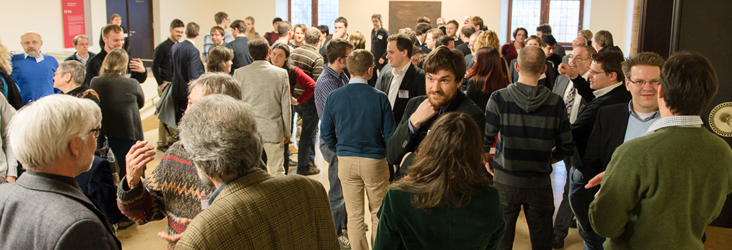
Events 2012
The Interdisciplinary Center for Scientific Computing (IWR) and its affiliated institutions organize a large number of events for discussing latest scientific results as well as identifing upcoming challenges in the field of Scientific Computing. In addition the IWR regularly hosts events which emphasis on broadening and improving the interdisciplinary dialogue.
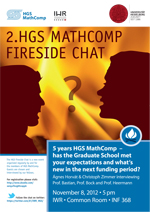
HGS MathComp Fireside Chat
"5 Years HGS MathComp – Has HGS MathComp Met Your Expectations?"
November 8, 2012
HGS fellows are spread over several different locations and institutes. Most of them see less than five other fellows per week. Accordingly a question underlying all discussions about HGS MathComp related issues among fellows is: Why should I bother about the graduate school? I have a nice research group!
Ágnes Horvát and Christoph Zimmer interview Prof. P. Bastian, Prof. H. G. Bock and Prof. D. W. Heermann
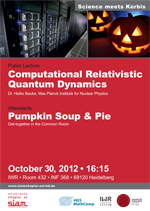
SIAM Public Lecture
"Computational Relativistic Quantum Dynamics"
Dr. Heiko Bauke, Max Planck Institute for Nuclear Physics
October 30, 2012
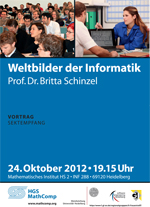
HGS MathComp Lecture
"Weltbilder der Informatik"
Prof. Dr. Britta Schinzel, University of Freiburg
October 24, 2012
ICLASS 2012 - International Conference on Liquid Atomization and Spray Systems
September 2-6, 2012
ICLASS 2012 is an international tri-annual conference which is associated with the Institute of Liquid Atomization and Spray Systems and takes shifts between Asia, the Americas and Europe. Scope is the exchange of research both at Universities and Industries in the investigation of spray systems ranging from industrial spray processes and combustion processes to medical and pharmaceutical applications.
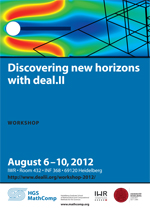
Workshop: "Discovering New Horizons with Deal.II"
August 6-12, 2012
The workshop focuses topics like:
- Use cases and applications of the library
- What users think would be useful directions for the library to go into, things that are missing, and possibly getting people together who can help implement those parts
- Newer parts of the library (e.g. massively parallel computing, multiphysics coupling, etc) and how these could help in your programs
We invite talks and plan discussions by users and existing developers in the following areas:
- Use cases and applications of the library
- What users think would be useful directions for the library to go into, things that are missing, and possibly getting people together who can help implement those parts
- Newer parts of the library (e.g. hp, multithreading, optimization, etc) and how these could help in your programs

HGS MathComp Romberg Guest Professorship Lecture
"Atomistic-to-Continuum Coupling Methods for Materials"
Prof. Mitchell Luskin, University of Minnesota
July 17, 2012
Many materials problems require the accuracy of atomistic modeling in small regions, such as the neighborhood of a crack tip. However, these localized defects typically interact through long-range elastic fields with a much larger region that cannot be computed atomistically. Materials scientists have proposed many methods to compute solutions to these multiscale problems by coupling atomistic models near a localized defect with continuum models where the deformation is nearly uniform on the atomistic scale.
During the past several years, a theoretical structure has been given to the description and formulation of atomistic-to-continuum coupling methods, and corresponding numerical analysis and benchmark computational experiments have clarified the relation between the various methods and their sources of error. Our theoretical foundation enabled the development of more accurate and efficient coupling methods.
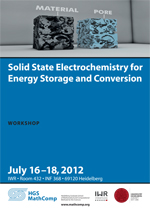
Workshop: "Solid State Electrochemistry for Energy Storage and Conversion"
July 16-18, 2012
This interdisciplinary workshop covers mathematical modeling and numerical methods applied to electrochemistry as well as the latest advances in experimental techniques and novel ionic materials.

HGS MathComp Von Neumann Lecture
"Adaptive Inexact Newton Methods for Discretizations of Nonlinear Diffusion PDEs"
Prof. Alexandre Ern, Université Paris-Est
June 12, 2002
We consider nonlinear algebraic systems resulting from numerical discretizations of nonlinear partial differential equations of diffusion type. To solve these systems, some iterative nonlinear solver, and, on each step of this solver, some iterative linear solver are used. We derive adaptive stopping criteria for both iterative solvers. Both criteria are based on an a posteriori error estimate which distinguishes the different error components, namely the discretization error, the linearization error, and the algebraic error. We stop the iterations whenever the
corresponding error does no longer affect the overall error significantly. Our estimates also yield a guaranteed upper bound on the overall error at each step of the nonlinear and linear solvers.
We prove the efficiency and robustness of the estimates with respect to the size of the nonlinearity owing, in particular, to the error measure involving the dual norm of the residual. Our developments are carried at an abstract level, yielding a general framework. We show how to apply this framework to the Crouzeix-Raviart nonconforming finite element discretization, Newton linearization, and conjugate gradient algebraic solution, and we illustrate on numerical experiments for the $p$-Laplacian the tight overall error control and important computational savings achieved in our approach.
Finally, we show how to apply our abstract framework to a broad class of discretization methods. This is joint work with M. Vohralik (University Pierre et Marie Curie Paris 6).

HGS MathComp Public Lecture
"Mathematical and Computational Modeling in Game Design"
Jens Schöbel, University of Applied Sciences, Darmstadt
May 15, 2012
Jens Schöbel is developer and group leader at Crytek, one of the most influential computer game companies worldwide. He also teaches game design at the university of applied sciences, Darmstadt.
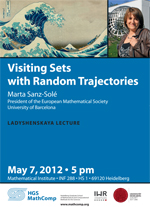
HGS MathComp Ladyshenskaya Lecture
"Visiting Sets with Random Trajectories"
Marta Sanz-Solé, President of the European Mathematical Society, University of Barcelona
May 7, 2012
Random fields are the basic abstract objects for stochastic modeling.
The analysis of the geometric measure properties of deterministic sets which are hit by a particular random field is an important problem. This is motivated mainly by the theory of Markov process and also by probabilistic potential theory.
In this talk, we shall firstly study this question in an abstract setting. More precisely, we will present upper and lower bounds on hitting probabilities of random fields in terms of Hausdorff measure and Bessel-Riesz capacity, respectively.
In the second part, these results will be applied to systems of stochastic wave equations in spatial dimension k ≥ 1. The specific properties of the probability densities of the solution play a crucial role. We will highlight the use of Malliavin calculus techniques for the study of this problem in the non-Gaussian case.
This is joint work with Robert Dalang (EPFL, Switzerland).
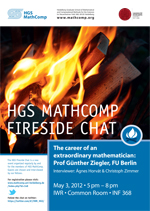
HGS MathComp Fireside Chat
"The Career of an Extraordinary Mathematician:
Professor Günther Ziegler"
May 3, 2012
Prof. Günter M. Ziegler visits HGS MathComp on May 3. The extraordinary mathematician holds the chair “Discrete Geometry” at the Freie Universität Berlin (FU Berlin) and he is also involved in the DFG Research Center “Matheon – Mathematics for Key Technologies”. In his research he treats problems from discrete and computational geometry (in particular, the theory of convex polytopes), explores and develops graph-theoretical, algebraic and topological methods in combinatorics, with applications e.g. to mesh generation and to linear and integer optimization.
Ágnes Horvát and Christoph Zimmer interview Prof. Ziegler.

HGS MathComp Public Lecture
„How Virtual Reality Led to a Paradigm Shift: Simulators for Diagnostics and Surgery Training in Ophthalmology“
Dr. Clemens Wagner, VRmagic GmbH
April 24, 2012
VRmagic is the world-leading supplier of virtual reality based simulators for ophthalmological training, both for diagnostic and interventional procedures. After introducing the medical background and the overall design of our simulators, some of the key technologies will be presented, including real-time approaches for soft-tissue modeling, computer graphics, and virtual reality interfaces. A short discussion of the relevance of simulation in the current educational context will conclude the talk.
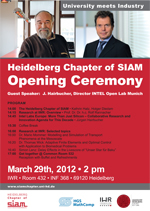
SIAM Heidelberg Chapter
"Opening Ceremony"
March 29, 2012
Five doctoral students of the Interdisciplinary Center for Scientific Computing (IWR) at Heidelberg University founded the Heidelberg Chapter of SIAM at the end of 2011. In the meantime, the group has grown to the largest German Student Chapter and celebrated its Opening Ceremony on March 29. With generous support of SIAM, IWR and the Heidelberg Graduate School MathComp, the event will celebrate the official opening of the SIAM Heidelberg Chapter with both participants from industry as well as renowned scientists of Heidelberg University.
5th International Conference on Modeling, Simulation and Optimization of Complex Processes.
March 5-9, 2012 — Hanoi, Vietnam
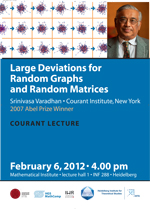
HGS MathComp Courant Lecture
"Large Deviations for Random Graphs and Random Matrices"
Prof. Srinivasa Varadhan, Abel Prize Winner 2007, Courant Institute, New York
February 6, 2012
In this joint work with Sourav Chatterjee we consider a dense random graph with a large number N of vertices and the edges are independently on with probability p and off with probability 1-p. There is a law of large numbers for the number of triangles as well as for number of various finite graphs that occur in the random graph. We derive a large deviation formula for these numbers, and predict which types of graphs are responsible for these large deviations. There is an interesting phase transition. The same method can also handle large deviations for eigenvalues of random symmetric matrices. A crucial ingredient is Szemeredis regularity lemma and its consequences.
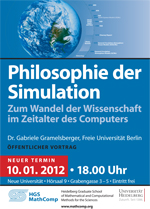
HGS MathComp Public Lecture
"Philosophie der Simulation - Zum Wandel der Wissenschaft im Zeitalter des Computers"
Dr. Gabriele Gramelsberger, Freie Universität Berlin
January 10, 2012
Seit der Einführung des Computers als Forschungs-, Experimentier- und Prognoseinstrument erleben die Wissenschaften einen tief greifenden Wandel. Nicht nur die Praktiken und Infrastrukturen wissenschaftlichen Arbeitens verändern sich, sondern auch die Logik der Forschung unterliegt einer grundlegenden Transformation. Neben Theorie, Experiment und Messung eröffnen Computerexperimente ein neues Feld der Wissensproduktion und verändern radikal die Experimentalkultur der Naturwissenschaften. Der Vortrag zeigt am Beispiel der Klimaforschung und der Biologie, welchen Einfluss die „in-silico“ Experimentalkultur hat.